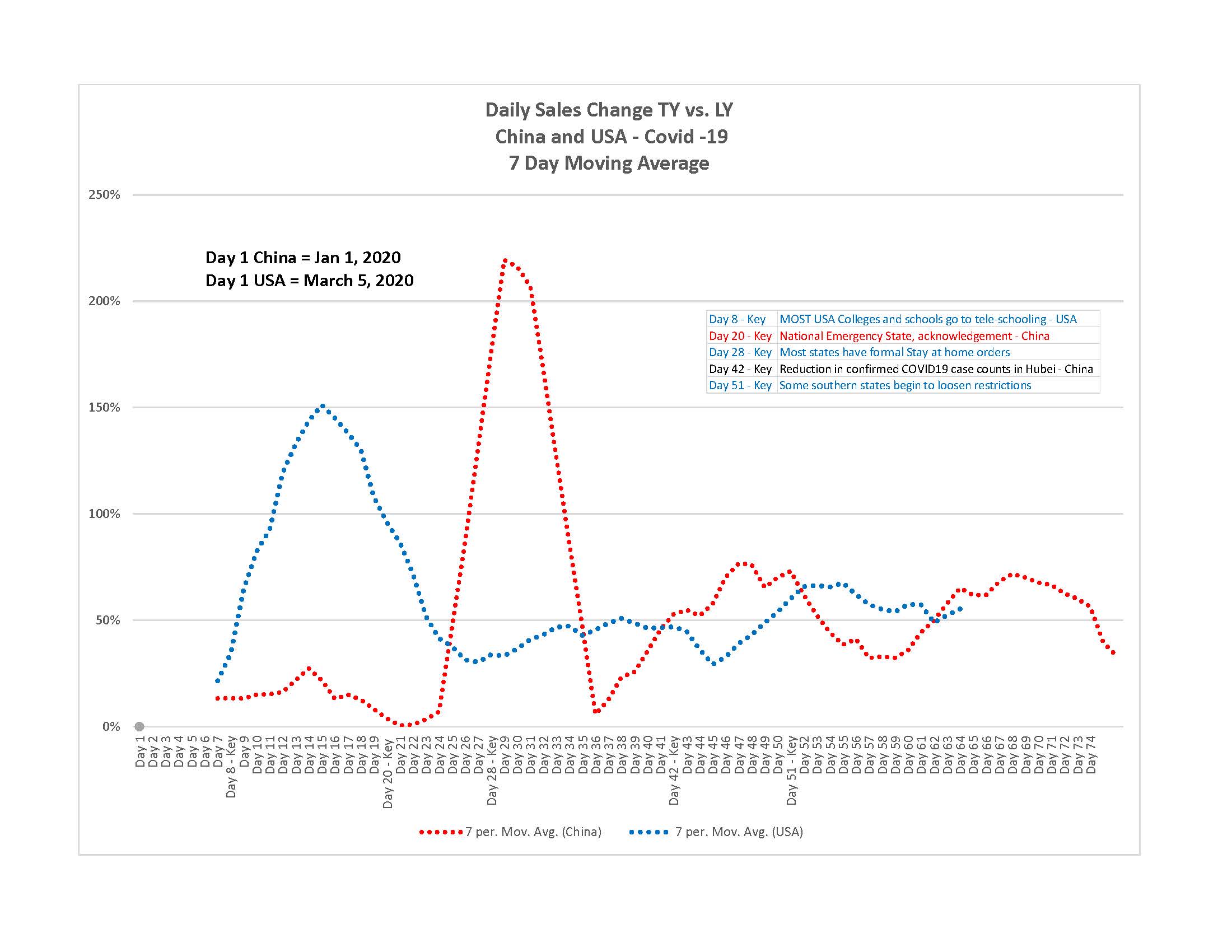Help Isom IGA recover from devasting floods

1 min read
IGA China's Shopper Behavior Predicts Future U.S. Behavior
Written by Jessica Vician
May 14, 2020
As COVID-19 isolation restrictions ease in China and Chinese shoppers begin to adjust their behaviors to a new normal, IGA—with nearly 1,000 stores throughout China and headquarters in the epicenter of the virus in Wuhan—is offered a unique insight into what lies ahead for U.S. retailers.
“China is roughly 90 days ahead in the pandemic cycle, but if you chart the behaviors from the beginning to now and lay the U.S. model over the Chinese one, there is a remarkable correlation of shopper response,” IGA CEO John Ross notes. In both countries, the onset of the virus brought panic buying, then as isolation continued and shoppers figured out that new normal, both countries saw a rise in e-commerce. “The good news is we can look at what happened there a month ago and use it as a predictor for what will happen here in a month,” Ross says.

So how are Chinese shoppers adjusting and what does it mean for U.S. shopper behavior? We spoke with Dr. Zhe Zeng, deputy director, IGA China to find out.
What does daily life look like now in China?
"The economy, businesses, restaurants, and schools are open or in the process of reopening, yet shoppers are still afraid," says Dr. Zhe, stressing that as experts continue to warn of future outbreaks, people trying to resume day-to-day activities are continuing with precautions like social distancing and mask-wearing.
Even reopened, life is still not "normal." Overall, travel is still discouraged. Taxi drivers are visibly uncomfortable if they think a passenger is not local, and hotels ask guests to stay in their rooms whenever possible. On public transportation, people try to sit apart when there is space, often avoiding eye contact. Many businesses and public places like parks are appointment-only to limit the number of people visiting at one time.
Restaurants in particular are feeling the strain, with as many as one third of smaller restaurants out of business permanently. Larger restaurants have reopened—and often see large crowds—but diners are cautious, wearing masks when not eating and choosing tables away from others. Younger generations (those 55 and younger) are out and about more than the older generation, as they are eager to have a restored sense of normalcy, Dr. Zhe says.
To further break down daily life and travel:
- Masks are required in many places, including at work and on public transportation.
- Most train transportation is almost fully operational, with precautions taken: travelers must confirm destination and health status and have body temperatures taken at the gates.
- Air travel is at about 70 percent of normal, with airport restaurants open and some even crowded. Travelers must wear masks, have their body temperatures read frequently, and many wear goggles. On the plane, the last three rows are reserved for people who start to exhibit symptoms during the flight and bathrooms are frequently sanitized.
Key takeaway for IGA USA retailers: As more businesses reopen, the new normal will not be the same as the old normal. Grocers will begin to have more competition as restaurants reopen but a strong opportunity remains for grocers while social distancing restrictions and fear continue to impact the restaurant experience.
How is the supply chain holding up?
“I don’t see many supply chain disruptions here,” Dr. Zhe says. “The local and central governments have made the flow of food products a priority.”
Even with a strong supply chain, shopper behavior is influenced by the news, with customers quick to hoard if they believe another outbreak is happening or if they think a price inflation is coming.
Key takeaway for IGA USA retailers: Shopper behavior will continue to be influenced by the news. If there is a meat supply disruption, expect shoppers to hoard meat; if there is a price increase on eggs, expect shoppers to voice their concerns on social media.
Has shopper behavior changed?
Dr. Zhe says that the pandemic has strengthened an individual’s shopping inclinations. For example, if a shopper prefers healthy foods, they will keep buying those foods and be willing to pay more for quality products in their comfort zones.
But as the pandemic has shored up what shoppers were already buying, it has changed how they are buying it. The Chinese grocery market—already much more advanced in e-commerce than the U.S. market—has seen a 54 percent increase in online sales from February to March. While Dr. Zhe expects shoppers who preferred visiting stores in-person will go back to in-store shopping as the outside environment becomes safer, he anticipates a lasting boost for online shopping.
Many IGA China stores use the social media app WeChat for online shopping, allowing people to see what’s in stock, place their orders, and pick them up the next day. In fact, Dr. Zhe says the popularity of shopping via WeChat has led many stores to have a dedicated employee managing and marketing their WeChat accounts. By combining shopping, entertainment, and social networking, WeChat and TikTok have been an easy, safe, and free way of retailing, he says.
Overall, the data shows the following impact on sales:
- Beverages, dairy, and staple foods have seen sales increases.
- Spending is closely correlated to the news, with bad news boosting panic buying and good news boosting sales in larger stores and on weekends.
- As the number of COVID-19 cases subsides and people start living their new normal, community store sales are returning to a normal range, continuing to perform well due to convenience and vicinity.
- When schools reopen, sales drop a bit because parents are busy.
- Coupons and deals have been very popular as shoppers become less financially secure.
Key takeaway for IGA USA retailers: Leverage your social media presence to communicate sales, hot items, etc. with shoppers, and invest in e-commerce to give shoppers alternative means of shopping your store.
What do things look like going forward for grocery stores in employee safety, sales, etc.?
Employee and shopper safety is still very important as people return to other aspects of normal life. As government restrictions ease and people start gathering again, there have been spikes in COVID-19 cases, which means that grocery stores must continue their strict sanitation efforts for employee and shopper protection.
It’s also important to continue motivating employees through the efforts that work best for them. “Meaningful and individualized rewards show employees they are cared for, valued, and embraced as a family and community member,” says Dr. Zhe. He says some stores provide sanitizing wipes, gloves, and masks to encourage associates to protect their families, while others have proactively changed company policies to provide better job security and family benefits.
"Without a crystal ball, prediction can be tricky in this changing and challenging time," Dr. Zhe says. But after observing trends, he anticipates these changes:
- Fragmented shoppers. People will break into even smaller subcultures, wanting to satisfy their unique dietary and health beliefs.
- Financially insecure shoppers. As more people lose their jobs, cash flow security, cost control, and cost-effectiveness will be crucial in marketing.
- Values-based marketing. Local brands, family businesses, and grassroots celebrities/influencers will resonate with shoppers.
- Increased insecurity. With no end to the pandemic in sight, people will have smaller comfort zones, less tolerance, and greater insecurity.
Key takeaway for IGA USA retailers: Safety, sanitizing, employee wellness, shopper values, and savings will all remain crucial as the months go on. Keep protecting employees and shoppers and motivating employees, while emphasizing your local points of difference.
You May Also Like
These Stories on Corporate News
Dec 14, 2023 11:07:22 AM |
2 min read
Jul 11, 2023 4:16:17 PM |
3 min read
Mar 15, 2023 11:23:00 AM |
1 min read



No Comments Yet
Let us know what you think